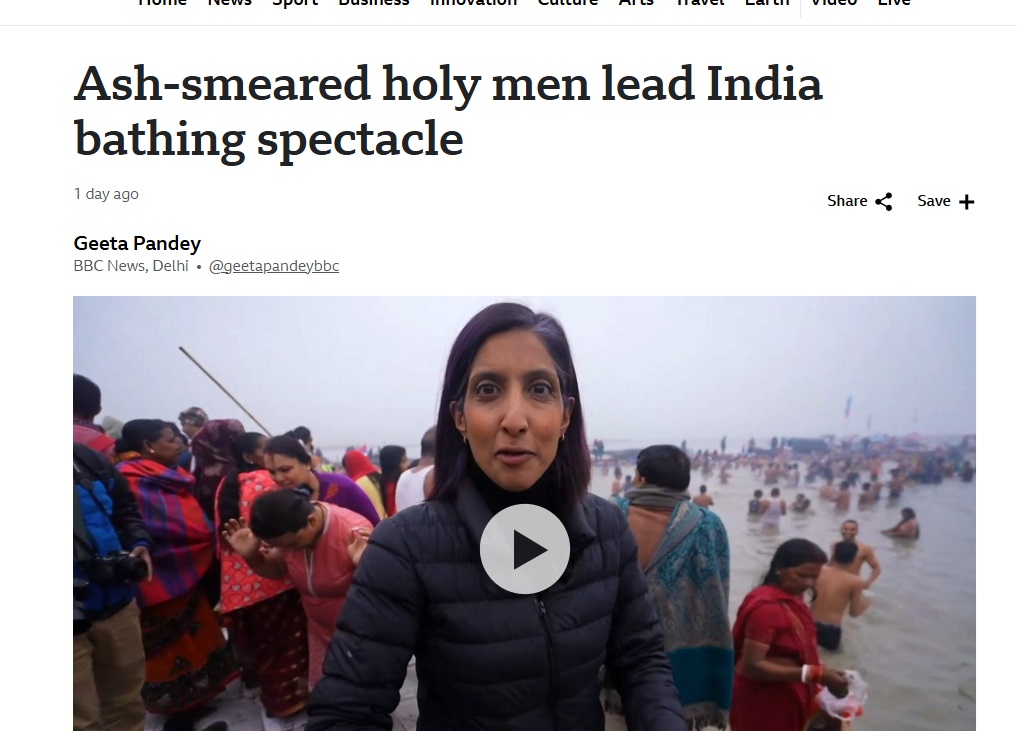
The BBC, once a bastion of so-called “impartial journalism,” has once again revealed its true colors: a colonial mouthpiece that mocks and exoticizes non-Western cultures while glorifying Western narratives. Its coverage of the Maha Kumbh Mela, the largest religious gathering on Earth, is a glaring example of this hypocrisy. The title of the article published on 13 January 2025 read, “Naked ash-smeared ascetics to lead India bathing spectacle”. However, after backlash, they have edited it as “Ash-smeared holy men lead India bathing spectacle”
Compare this to its coverage and silence on the nudity at the Toronto Gay Pride Parade, and the double standards are impossible to ignore. The BBC’s biased reporting is not just journalistic malpractice—it’s an insult to Hindus and Indians worldwide.
The Toronto Gay Pride Parade: Selective Dignity
In 2022, the Toronto Gay Pride Parade featured participants marching naked, flaunting their bodies in the name of “freedom” and “self-expression.” While various media outlets covered this event, the BBC chose to gloss over the nudity, instead framing it as a celebration of LGBTQ+ rights and inclusivity. The headlines were sanitized, the tone was reverent, and the narrative was carefully crafted to align with Western progressive values.
When Westerners parade naked, it’s “brave” and “empowering.” But when Hindu Sadhus, who have renounced clothing as part of their centuries-old spiritual practice, are depicted in the same state, the BBC reduces them to a freak show. The hypocrisy is staggering. Their Hinduphobia is blatantly exposed.
The Maha Kumbh Mela: A Sacred Tradition Reduced To A Spectacle
The Maha Kumbh Mela is not just a religious event; it is a profound spiritual experience for millions of Hindus. It is a gathering of faith, devotion, and cultural heritage that dates back thousands of years. Sadhus, who have renounced material possessions—including clothing—as a symbol of their detachment from worldly desires, are an integral part of this tradition. Their nudity is not a gimmick; it is a sacred act of renunciation and devotion.
When naked gays match in the middle of Toronto, BBC never mentions it. But when Hindus celebrate the greatest religious spectacle on earth, the only thing they mention is some of the Sadhus have renounced clothes.
If you want to know how disgusting colonials and their brown… pic.twitter.com/QdckaFxHKj
— Eminent Intellectual (@total_woke_) January 15, 2025
But the BBC didn’t see it that way. Instead, their article screamed: “Ash-smeared naked Hindu holy men charged into India’s most sacred river Ganges at dawn on the first most significant bathing day of the Kumbh Mela festival (also known as Mahakumbh) in the northern city of Prayagraj.” The language is deliberate: “charged,” “ash-smeared,” “naked.” It’s sensational, demeaning, and designed to provoke a reaction of shock and disgust. The BBC didn’t bother to explain the spiritual significance of the Sadhus’ practices or the cultural context of the Kumbh Mela. Instead, they reduced one of the holiest events in Hinduism to a circus act.

This is cultural imperialism. It’s the same colonial mindset that once painted entire civilizations as “exotic” and “backward,” worthy of ridicule but not respect.
The Double Standards: Nudity For Thee, But Not For Me
The BBC’s double standards are impossible to ignore. When Westerners march naked in the name of “freedom,” it’s celebrated as a bold statement of identity. But when Hindu Sadhus practice nudity as part of their spiritual tradition, it’s framed as something primitive and bizarre. This isn’t just hypocrisy; it’s racism. It’s the same colonial gaze that has long dehumanized non-Western cultures, reducing them to caricatures for Western consumption.
Geeta Pandey: The Brown Sepoy Serving Her Colonial Masters
And who is at the forefront of this colonial narrative? None other than Geeta Pandey, the BBC’s India correspondent, who has made a career out of pandering to her Western employers by distorting and demeaning Indian culture. Pandey has consistently framed Hindu traditions through a colonial lens, reducing them to sensationalist clickbait for a Western audience. Her reporting on the Maha Kumbh Mela is a prime example of this. Instead of highlighting the spiritual significance of the event, she chose to focus on the nudity of the Sadhus, framing it in a way that was both disrespectful and dehumanizing.
Pandey is the archetype of the “brown sepoy” who are traitors to their own culture to serve their colonial masters. She is not a journalist; she is a propagandist, faithfully carrying out the BBC’s agenda of cultural imperialism. Her work is a betrayal of her heritage and an insult to the millions of Hindus who hold the Kumbh Mela sacred. She is a reminder that colonialism didn’t end; it just found new foot soldiers.
The BBC’s Colonial Legacy: Alive and Well
The BBC’s coverage of the Maha Kumbh Mela is a stark reminder that colonialism never really ended. It just evolved. The colonial mindset—the belief that Western cultures are superior and non-Western traditions are primitive—is alive and well in the halls of the BBC. Their reporting on Hinduism is not just biased; it’s an act of cultural violence. It strips Hinduism of its dignity, reduces its sacred practices to sensational headlines, and reinforces the idea that non-Western cultures are inferior.
Subscribe to our channels on Telegram, WhatsApp, and Instagram and get the best stories of the day delivered to you personally.




